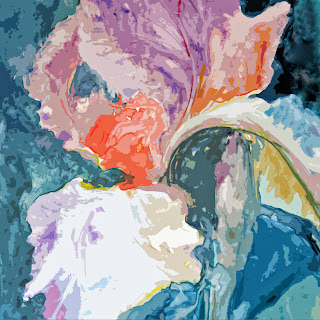 When I graduated from Elkhorn high school (EHS class of 1969) and headed off to the state university twenty mile from the farm where I was raised, I had two ideas in mind. I would either major in English and teach high school students how to love literature and write decent research papers, or I would major in art and teach high school students how to - what? Love art as I did.
When I graduated from Elkhorn high school (EHS class of 1969) and headed off to the state university twenty mile from the farm where I was raised, I had two ideas in mind. I would either major in English and teach high school students how to love literature and write decent research papers, or I would major in art and teach high school students how to - what? Love art as I did.
I ended up with the English option by default. My freshman intro to art class was held in the basement of a science building on campus, a cement bunker where I was urged to draw with a black marker and not lift it from the page. We also were required to carve blocks of wood into interesting shapes with a set of Exacto blades. After I accidentally drove the blade into the middle joint of my left pointer finger and fainted dead away onto the cement floor, followed by several stitches in said finger, I decided that writing term papers about Shakespearean heroines was easier and safer. I became an English major.
 So - I never got to take a figure drawing class. I like drawing people, but my "models" are usually sleeping people at airports or the library, or the beach. I have drawn the back of many heads. I try to draw people quickly in theaters, coffee shops, whatever I can. But once spotted, people either become nervous or self-conscious and it's over.
So - I never got to take a figure drawing class. I like drawing people, but my "models" are usually sleeping people at airports or the library, or the beach. I have drawn the back of many heads. I try to draw people quickly in theaters, coffee shops, whatever I can. But once spotted, people either become nervous or self-conscious and it's over. I thought I had the answer this summer when I read about a summer figure drawing class in Madison. I had looked at these classes before, but the driving and the timing concerned me. I live 40 miles from the UW Madison campus, and most classes ran until 10:00 PM, which meant I would get home really late (for me). I hate to admit it, but my eyes aren't as good as they once were, especially at night. This class runs until 9:14 p.m., which means that if the weather is good, and road construction isn't too awful, I get home by 10:30 p.m. I keep the cell phone charged,
 Anyway, I have enjoyed the evenings once a week devoted just to drawing. On my own at home I tend to work a lot from photos, and this class forces me to use my eyes, to work from a live model.
Anyway, I have enjoyed the evenings once a week devoted just to drawing. On my own at home I tend to work a lot from photos, and this class forces me to use my eyes, to work from a live model.
 Anyway, I have enjoyed the evenings once a week devoted just to drawing. On my own at home I tend to work a lot from photos, and this class forces me to use my eyes, to work from a live model.
Anyway, I have enjoyed the evenings once a week devoted just to drawing. On my own at home I tend to work a lot from photos, and this class forces me to use my eyes, to work from a live model.Ah, a live model. Herein lies the rub. Of the five classes I have attended, only three have had models. Twice no model showed up at all, so we were reduced to drawing each other. I was disappointed. I ran this little pep talk in my head:
You paid your fees. You want to learn to draw from life. You want to learn new techniques. Quit your bellyaching and draw!
Yes, but there is the two hours of driving, the rushing around, the parking fees...
Sherry, quit your bellyaching and draw!













